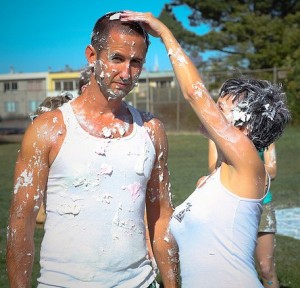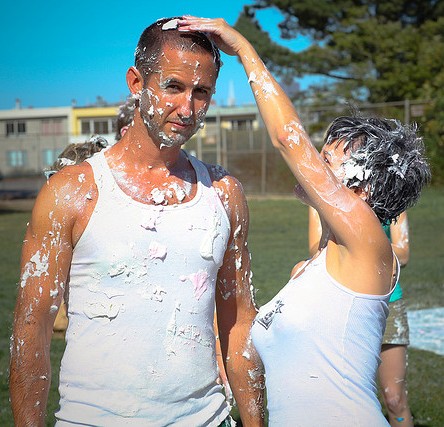[This is an interview I did with Jake and Melissa Kircher, authors of 99 Thoughts on Marriage and Ministry and bloggers at The Holymess of Marriage. They’re also regular contributors at Relevant Magazine.]
1) Why do you describe marriage as a mess?
Because when you get married you have to change. Period. Regardless of race, religion, age, economic status, or anything else. You’re living intimately with another person. Your quirks will annoy them. Your habits will be different than their habits. Your families will have different expectations and ways of doing things. Your pasts will end up being triggers for each other. Your faults will cause pain. Your fears will become tension points. Even your strengths can become areas of friction and jealousy.
 Marriage requires that each unique couple figure out the millions of tiny, and not so tiny, adjustments that need to be made in order for the relationship to survive. Our culture likes to say that if you have to change who you are, the relationship isn’t right. Get out.
Marriage requires that each unique couple figure out the millions of tiny, and not so tiny, adjustments that need to be made in order for the relationship to survive. Our culture likes to say that if you have to change who you are, the relationship isn’t right. Get out.
But this is so false. You have to change who you are to some degree. Have you met you?! No matter who you are, there are plenty of things that have to be worked on and a marriage relationship will bring them to light in a major way. We’re not saying that spouses should compromise on their innate personhood. In fact, marriage partners should support and grow the gifts, talents, goals and so forth of their mates. But you’re going to end up divorced if you think you’ll never have to fix a fault, heal an old wound, become a more experienced communicator, change the way you go about daily life, do things you don’t want to, give up things you enjoy, compromise on life goals, move somewhere you’re not thrilled about, get rid of comfortable habits, sacrifice time and probably money, and acknowledge that your spouse is just as flawed as you are.
Two people mean messes. But two people who change and shift and grow turn those messes into opportunities to create a tight, loving bond.
2) You say that the demanding, difficult, and messy parts of marriage refine you, challenge you, and make you better as individuals and as a couple. Do you have an example of this happening in your marriage?
We got kicked out of our first apartment. That was a pretty key moment. Imagine how it feels to have your landlord tell you that you have to leave because she just can’t take the screaming and yelling anymore? And then her little four-year-old chimes in, “Yeah, we hear you fight!”
Talk about embarrassing.
We didn’t tell anyone about that for a long time. But as embarrassing as the situation was, it shoved our butts into gear. We realized that although we’d done a fair amount of pre-marital counseling and personal counseling before we got married, there were obviously still major issues that needed to be addressed. We found an amazing marriage counselor who literally saved our relationship. Our book is actually dedicated to him because of that. Being kicked out made us deal with our crap in a way that perhaps we wouldn’t have had we not been so ashamed and embarrassed. That landlord had no idea how much her honesty helped us to grow and take a good, hard look at what needed to change.
3) You write in your book that after two years of marriage, your relationship was crumbling. How did that happen, and what did you do?
We began our marriage with Jake pretty much giving Melissa an ultimatum. It was, “I’m called to be in ministry and at this particular church and if you want to be married then agree to this life plan.” This was super unwise for a number of reasons. Number one, a marriage should be a partnership and because we focused on the calling and desires of only one spouse, it created a lot of bitterness and resentment between us. We needed to instead decide how to mesh our two lives, callings, talents, and goals together. This lesson was absolutely learned the hard way in a counselor’s office after the word “divorce” had been thrown about quite a lot.
The second aspect of what lead to our crumbling relationship was unfortunately an unhealthy work situation for Jake. His youth pastor job was part-time, but yet he worked full-time hours. Just to make things work financially, Jake worked two other jobs at the same bringing his work week to around 70 hours a week. At the same time, to support Jake in his ministry and help pay the bills, Melissa was working a job she hated. By the end of year two of our marriage, Jake was totally burnt out and Melissa was angry. Jake withdrew emotionally, sexually, and relationally. It was devastating to Melissa who knew that it was time to leave that church, but who had a husband unwilling to listen to her.
The third part of the crisis point at that time was family issues that Melissa had not dealt with entirely. She grew up in an emotionally and verbally abusive household and had worked through some of that pain, but marriage had brought out even deeper wounds. Jake’s often very loving and innocent actions triggered intense and inappropriate emotional outbursts from Melissa that stemmed from incidents that happened in her past. All these things pushed us further and further apart. We were caught in many cycles of accusation, anger, hurt, and frustration.
Thankfully through the great counselor we mentioned before, as well as a new full-time position for Jake, we were able to work through everything and really heal our marriage by learning healthier boundaries, much better communication and by supporting one another’s gifts and goals equally.
4) You say that “a good marriage is a proactive one.” What do you mean when you say this?
Oliver Wendell Homes once said, “Greatness is not in where we stand, but in what direction we are moving. We must sail sometimes with the wind and sometimes against it – but sail we must and not drift, nor lie at anchor.”
We are actually re-thinking right now what it means to have a “good” marriage. Much of what current relationship resources tote as a good marriage is one where conflict is at a minimum, emotions are calm, compromises have been made and there is a general sense of peace. This is not our marriage! When we look at marriages today, the ones we’ve seen survive are the ones that are active. They fight. They continually rub each other the wrong way. They go to counseling even when things are going well. They plan trips without the kids. They freaking sleep without the kids!
Obviously, the personalities of each spouse influence how they interact with one another, but in our observations, sometimes a marriage is “peaceful” because spouses never discuss their feelings. Or there is less fighting because each partner chooses to bury their hurts. Our thoughts are leaning more and more towards the idea that stagnation in a relationship means death. It should never be too comfortable. Your spouse should always be challenging you. Your marriage should always be stretching you. And it takes choices towards action (being proactive) in order to do this. You must choose to communicate, to fight, to address the hard things. And you must choose to work on your marriage even when everything seems great.
5) You say that you’ve been blessed with mentors along the way that have helped you in your marriage, what was one thing they have helped you with?
Honesty. An outside perspective on your relationship will challenge and refine you like no other. Even harsh honesty that isn’t welcomed or sought out can be the most precious gift. Melissa had a dear friend, who she’d consider a mentor, sit her down before we got married and pointed out a number of problems in our relationship. The friend even suggested that maybe we shouldn’t get married or wait a while because of these issues. We totally ignored her wisdom and guess what?! Every single thing she said became a major source of discord in our young marriage. She was honest and she was right and we had to get into professional counseling to work through all that stuff. The wisdom and insight of others can really propel a marriage towards health and longevity.
6) Recently you wrote an article for Relevant Magazine entitled, “4 Things We Wish We Knew About Sex Before We Were Married.” What inspired you to write this?
Sex is really different than both the media and the conservative Christian community portrays it. It has been a point of tension in our marriage since day one and pre-marital counseling did very little to prepare us. No matter if you’re a virgin or to quote a Facebook fan, “do it a whole lot before marriage in order to get it right,” sex is just plain difficult. And messy. And exciting. And vulnerable. And frustrating. And satisfying. There needs to me much more conversation about the realities of sex within a committed marriage relationship and this article was just the very tip of that conversation iceberg. [You can read the article on Relevant Magazine]
 7) How can people buy your book, 99 Thoughts on Marriage and Ministry?
7) How can people buy your book, 99 Thoughts on Marriage and Ministry?
They can buy the book HERE. Our publisher is running a one-day 50% sale on our book TODAY ONLY (Thursday, April 25th). If you buy our book today, it will only cost you $2.99.
About Jake and Melissa Kircher:
 Jake and Melissa were married on August 27, 2005. Jake is the Youth Pastor at Grace Community Church. Melissa is a self-employed artist in painting, photo-processing, graphic design and writing. They currently live in Connecticut and have one foster son who loves to bang on the drums and another baby coming sometime late May/early June. You can find them at their blog, The Holymess of Marriage.
Jake and Melissa were married on August 27, 2005. Jake is the Youth Pastor at Grace Community Church. Melissa is a self-employed artist in painting, photo-processing, graphic design and writing. They currently live in Connecticut and have one foster son who loves to bang on the drums and another baby coming sometime late May/early June. You can find them at their blog, The Holymess of Marriage.
photo credit: boltron-, Alex Christine Photography
